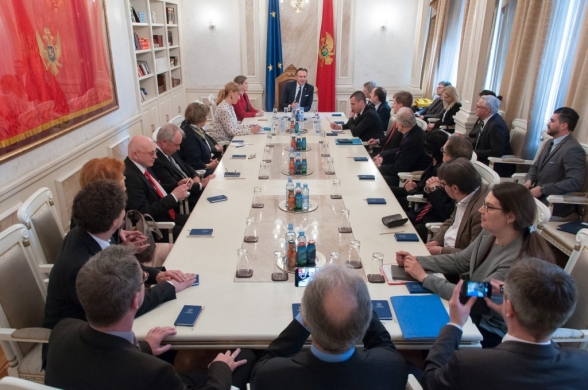President of the Parliament of Montenegro Mr Ranko Krivokapić received members of the German section of the International Commission of Jurists. They discussed the legal regulation of the state of Montenegro, particularly focusing on the responsibilities and work of the Parliament of Montenegro and its relation with other branches of power.
President Krivokapić used the opportunity to inform interlocutors on transition processes of Montenegro, particularly those concerning amendments to the Constitution, a new election law, and legislative solutions stemming from the constitutional amendments with regard to Supreme Public Prosecutor and Special Prosecutor's Office.
“By continuous development of its capacities and implementation of its constitutional responsibilities, the Parliamemnt of Montenegro has become a new public good of overall democracy in Montenegro. Parliament’s development represents a permanent path aimed at controlling a powerful branch of government as the executive one. The state draws its strength from its institutions, and only if a system as whole operates responsibly, then we get tangible results that we call the rule of law. The rule of law is a prerequisite for economic and social development and ultimately the development of the country by the standards of Euro-Atlantic community, which is Montenegro's foreign policy priority”, Mr Krivokapić emphasised.
The interlocutors concluded that Montenegro worked and achieved noticeable results at its Euro-Atlantic course.
Members of ICJ stressed that the Constitution of Montenegro was a modern and civic one, with clear guidelines and a room for the construction of a state based on a system of rule of law. A special time during the talk was devoted to the fact that 2016 was election year, and that free and fair elections were the first step without which there is no further undisputed power and strength of the institutions. In this regard, they concluded that full and resolute implementation of the law and strong institution create the conditions for citizens to freely express their will at the elections.









